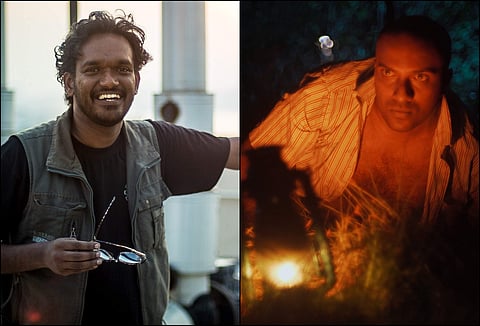

Some filmmakers tell you that their films reflect their personalities. Krishand, writer-director of the latest SonyLiv release, Aavasavyuham, doesn’t need to do that. It’s self-evident when he is engaged in conversation with you. He is like a walking encyclopedia; just like his film, Krishand reveals himself as someone well-versed in diverse topics—from anthropology to ecology to graphic novels to superhero movies. And yet, you are not intimidated by him. He is wary of sounding too intellectual or philosophical, and I found this self-awareness endearing. He doesn’t look at Aavasavyuham as a “work of art”; just another “product.”
The film has won raves from all corners. Its origin began as a single Facebook note, which underwent multiple mutations, eventually morphing into a superhero concept—a superhero with some amphibian traits. “Initially, I imagined a man-fish hybrid, but I knew that would be difficult to pull off, so I came up with the frog,” Krishand recalls. One of its inspirations was the 1954 Hollywood monster movie, Creature from the Black Lagoon. “Joy is a vastly modified version of the creature from that movie,” says Krishand, who also cites Alan Moore’s comic book Swamp Thing as an inspiration. “The other inspirations, of course, are our upbringing, thought processes, and the things we see around us.”
As for the narrative approach—a blend of disparate genres including mockumentary, thriller, horror, and satire—Krishand found inspiration in the oral biography format of Fight Club author Chuck Palahniuk’s graphic novel, Rant. “I felt this method would allow us to communicate information easily without relying on foreshadowing. But the problem with following any particular format is that people tend to get bored after twenty minutes, so we had to find ways to make it more attention-grabbing. I first thought of going for a full-on bizarre mode, but I decided against it because it might be indigestible for regular audiences. So I managed to do that only to a small extent.”
A fan of unconventional superhero films like M Night Shyamalan’s Unbreakable and Josh Trank’s Chronicle, Krishand sees Aavasavyuham as one—a kind of superhero film that’s also about a lot of other things, such as our ethno-geographical background. “I was thinking about many things, like a world sans borders. I was thinking about migration and how everything—including animals and humans—is in a constant state of motion. Then came other stuff like class, religion, labels... Ecological and environmental concerns also got involved, but I didn’t want to convey them in a regressive way. The idea was not to say, ‘You should conserve the environment, but rather, it’s better if you conserve it. We exist among all kinds of species, and I’m always interested in interwoven structures between animals and humans. Why can’t there be peaceful co-existence?”
For Krishand, Joy, played by Rahul Rajagopal, represents nature itself. “It was the first thing that came to mind when I imagined this character. I even wondered if that was a cheesy analogy,” he laughs.
Krishand doesn’t believe in giving a single definition to 'art', and he is okay if people experience Aavasavyuham as just another piece of entertainment without reading too much into it. He doesn’t want to tell others what kind of art they should consume and how. “Art is mostly self-expression, and a viewer interacts with it on the basis of their experiences, upbringing, mental well-being, and any privileges they happened to possess. Cinema means different things to different people—and therein lies its magic. I wanted Aavasavyuham to have elements that appeal to all groups of viewers, which explains, for example, the merging of the thriller and philosophical elements.”
Krishand’s kind of cinema is one where “content and form are interrelated,” not the kind where “either of them overshadows the other.” “If you’re really smart, people shouldn’t see your technique, they should see your result,” he says. “There was a time when I used to strongly believe that content decides the form. Now I feel that they should move in perfect harmony; if there is a correct mix of the two, it means we are successful in our intent. Form over content doesn’t work. For example, I think Marvel movies have form and content going well together. As for their merits, whether a piece of work has enough depth or not is measured by someone’s visual privilege. Someone can amass vast amounts of knowledge, but all of that is pointless in the absence of empathy.”
One of the film’s actors, Zhinz Shan, who played the fisherman for whom Joy becomes a lucky charm, was an integral factor for Krishand setting Aavasavyuham in Puthuvype. “I first thought of shooting it somewhere else, but then I found Puthuvype a more interesting choice, and one of the reasons for that is the presence of the petroleum plant over there. I was particular about respecting the ethno- geographical aspects of whichever place we were shooting in. Zhinz, who hailed from Puthuvye, introduced us to every nook and corner. I would say the story changed quite significantly after he got involved.”
Aavasavyuham was honoured with the Best Film trophy at the recent Kerala State Awards. Krishand is not one of those filmmakers that think awards don’t matter. “It does. Why not? It’s a big deal, man,” he says. “Did it change my life? Indeed. It helps with visibility. The ethos part of it all is so important.”
I ask him if he ever would make a full-fledged commercial film—a big-budget superhero project, perhaps?—and he replies that anything he makes will have a slightly “idiosyncratic” bent. “Even if I make a full-fledged superhero film, it will look like Aavasavyuham. I want people to get slowly familiarised with my style. I don’t think I can make something brilliant and mind-blowingly abstract as, say, Krishnendu Kalesh’s Prappeda (another genre-bending state award winner). Whatever I make, it should be something that at least my mom understands,” he chuckles.